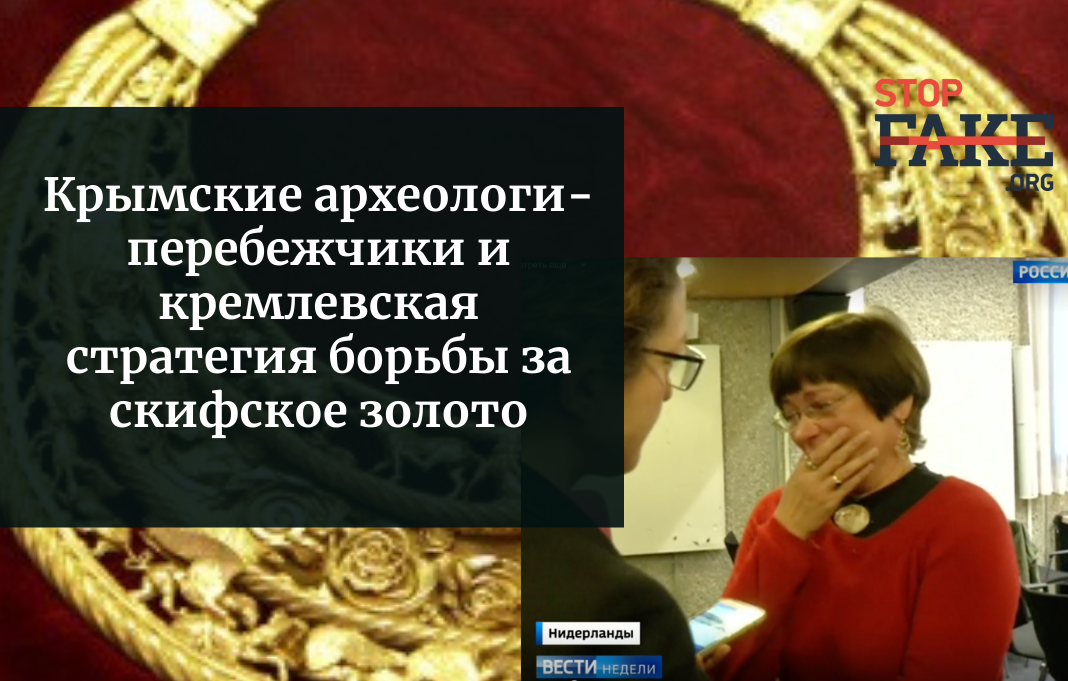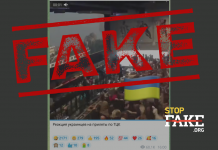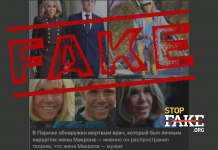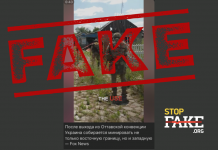The main characters in the fight over the Scythian Gold collection from the Russian side were Ukrainians who hastily painted themselves over in the hues of the Tricolor flag immediately after the Kremlin captured the peninsula. For example, the curator of an exhibition organized by the former Crimean branch of the Institute of Archeology of the National Academy of Sciences of Ukraine, Valentyna Mordvintseva. In April 2014 she claimed that the “change of power” in Crimea had nothing to do with the preservation of cultural values and that Crimean museums would even continue to operate within the framework of the National Academy of Sciences of Ukraine.
“Understand me correctly – I’m very positive towards Ukraine. I am a patriot. My personal political identity is Ukrainian. For me, what happened is a great tragedy,” Mordvintseva said in an interview with DW in 2014.
At that time is was clear to everyone that this was not just an example of ordinary Soviet opportunism, but that Valentyna Mordvintseva knew for sure that there would be a fight for the return to the Crimea of these exhibits, which she had lent out, and that she would have to lead this struggle. She will do it faithfully, using all her contacts in the museum environment. No one was surprised when, after several years of such loyal activity in Dutch courts for the benefit of Russia, the “Ukrainian patriot” Mordvintseva was promoted and ended up in Moscow, at the Higher School of Economics.
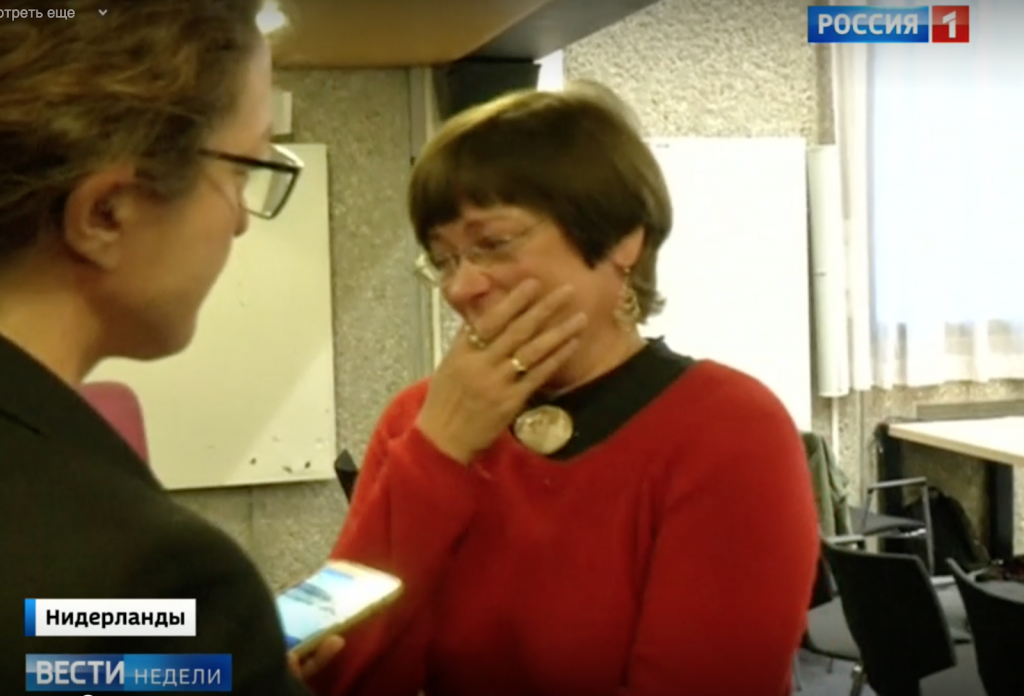
Mordvintseva quickly forgot about her Ukrainian patriotism; in footage from the Netherlands immediately after the announcement of the court decision, we see how she nervously drinks water and cannot hold back her tears, and not because she is happy for Ukraine.
“I think it’s dishonest to give the exhibits to anyone other than the Crimea,” Mordvintseva says through tears. She urgently writes an article for Novaya Gazeta, saying that, “in accordance with international museum law, objects must be returned to the doors from which they exited, that is, to the Crimean museums.” The only snag here – which her fellow archaeologists immediately wrote to her about – is that there simply is no “international museum law.” That is something curator Mordvintseva and her curators from the Kremlin invented on the fly in order to somehow justify their failure in court. Also, some colleagues suggested that Valentyna Mordvintseva, consistent with this position, should demand the return to the Crimea of artifacts found there but now kept in the Hermitage and the Pushkin Museum.
While Russian “analysts” and “experts” argue over the reasons for the court’s decision and who should be punished for the setback, StopFake journalists tried to determine why Russia chose to stay on the sidelines during the proceedings, hiding behind the backs of its Crimean collaborators.
“Ihktamnyet”
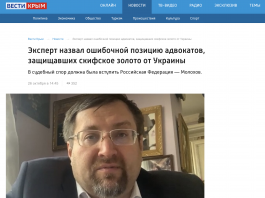
During the trial over the Scythian Gold, the Kremlin adopted a quiet tactic, “ikhtamnyet,” which means, literally, “they’re not there,” and bringing to the fore the Crimean museum workers, who, supposedly, by themselves and on their own initiative fought for the “cultural values of Crimea.” However, after the resounding defeat in court, Russian propagandists got really angry and – as Aleksander Molokhov, deputy head of the expert council on legal issues under the occupation “government” of Crimea, put it – even began to “wash dirty linen in public.” The official accused the Russian government of not entering into the fray against Ukraine, thus leaving “the Crimean museums one on one with Kyiv.”
In a commentary for StopFake, Crimean historian and political scientist Yevheniya Horyunova explained that Russia has once again used the peninsula in its machinations. In this case, the Kremlin decided not to use the narrative of “Crimea’s reunification with Russia” and “return to its native harbor” to achieve its goal, which would have only hurt its case, but resorted to the thesis “Crimea is Crimea.” Horyunova emphasized that Russia stood behind the backs of the Crimean museum workers, demonstrating that the main issue in the process is supposedly the cultural component, and not politics. That is why the Crimean museums became the main plaintiffs in the proceedings over the Scythian Gold, Horyunova believes.
“In this case, Russia is just trying to move away from the political component and show that this is culture, and culture is outside politics. That is why the Crimean museums have become the main actors in this process, and Russia can only act as an intermediary here – to help, for example, with money, but not be in the foreground of the struggle and not act as a plaintiff against Ukraine, against the Netherlands. Russia uses precisely this tactic, declaring only when it is beneficial that Crimea allegedly “choose reunification,” a return to its “home harbour” and other things. But when it is beneficial for the Kremlin to demonstrate a cultural aspect, then Russia tries to stay in the background, with no mention of politics, then accusing the court of making a “political decision,” says Yevhenia Horyunova.
Ukrainian ace in the hole
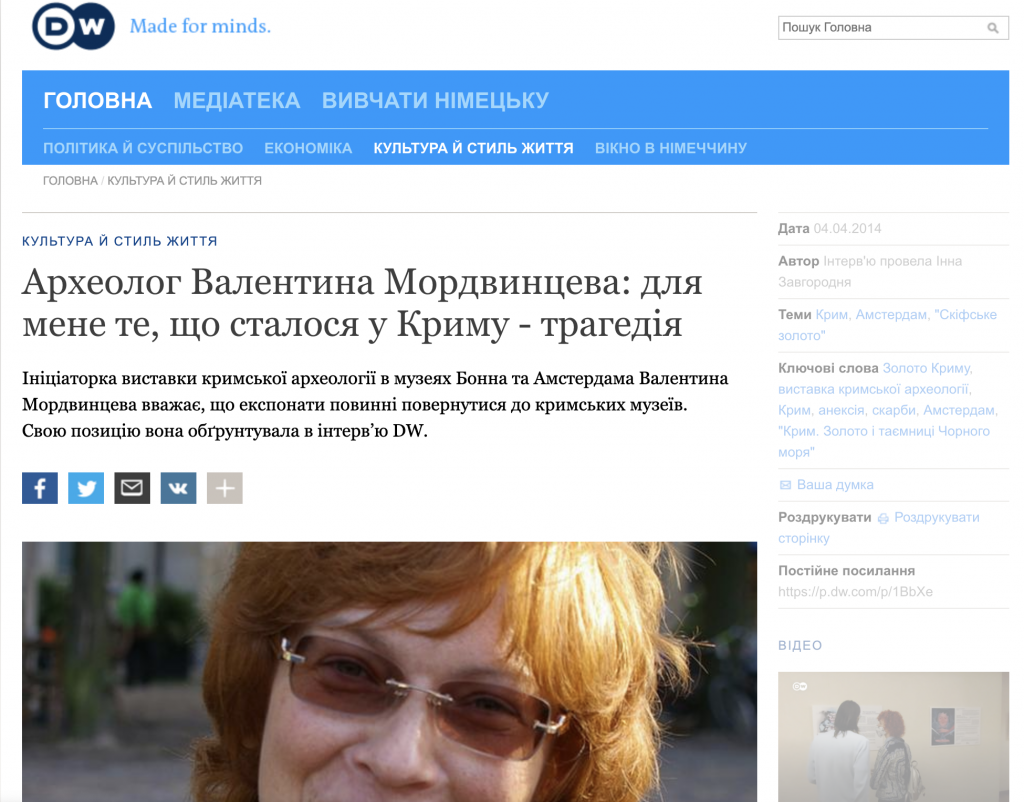
That is why representatives of four Crimean museums came to the fore in the struggle for the exhibits of the collection “Crimea – a Golden Island in the Black Sea” on behalf of the temporarily occupied peninsula. The Kremlin began to skillfully manipulate and focus on the “Ukrainian identity” of the Crimeans. Even before the first round of legal proceedings, the Russia’s propagandists for a while “forgot” about the hackneyed narrative that the occupation of Crimea was “all about restoring historical justice,” and launched the thesis that “culture is outside of politics” and “Crimea is Crimea.”
In 2014 Russia tried to “peacefully” negotiate the collection away from the Netherlands, arguing that the occupation of Crimea supposedly had no effect on culture.
Such tactics on the part of the Crimean collaborators did not bring the expected results, and many years of litigation began. However, the Crimean museums did not throw away the Ukrainian card entirely. In 2016, during the first public hearing of the District Court of Amsterdam, another representative, historian Nikita Khrapunov, tried to play an “ace of a citizen of Ukraine.” The Russian media happily supported the Khrapunov “legend”.
The propagandistic publication Ukraina.ru wrote: “The historian Khrapunov, representing the Crimean side, emphasized that he holds a Ukrainian passport, and, in the Crimean referendum, even voted against joining Russia, but still stated that the artifacts belong to the Crimean museums, and his passport has nothing to do with it.”
The Kremlin tried to manipulate the topic of the occupation of the Ukrainian peninsula in its favor. Ukrainian archaeologist and head of the Inkerman team of the Sevastopol archaeological expedition, Evelina Kravchenko, Ph.D., explained in a comment for StopFake. Russia claimed in court that its takeover of Crimea changed nothing and, therefore, the collection should be “brought home.”
“It was extremely beneficial for the Russian side in the lawsuit to feature the Crimean museum workers, since a claim from museums re-registered in Russia would simply not be accepted. So it presented the museums as Crimean, as Ukrainian, in which nothing had changed since the occupation. Even before the occupation the Kremlin was already actively working on Crimean museum workers, pounding into their heads that nothing would change for them. This is also the policy of the Russian Federation towards ordinary Crimeans, as well as intellectuals and scientists,” says Kravchenko.
Propagandists with status
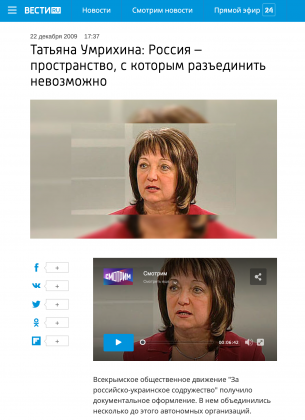
Along with the “Ukrainian” card, the Kremlin decided also to play the card of “cultural justice without politics.” For this role, Russia chose politically biased Crimeans, including the odious Tetyana Umrykhina, a former Ukrainian official, now the “general director of the East Crimean Historical and Cultural Museum-Reserve”.
Even before Russia’s capture of Ukrainian Crimea, Umrykhina managed to distinguish herself there with her pro-Russian views and anti-Ukrainian activities. Leading up to the 2010 presidential elections, she actively lobbied for the pro-Kremlin candidate from the Party of Regions, Viktor Yanukovych, while also calling for the development of “fraternal relations” with neighboring Russia. Kremlin media gleefully relayed Umrykhina’s messages about “Crimea’s joint inseparable space with Russia”, her narratives about a “shared future” and “the infringement of the rights of Russian speakers by official Kyiv” and promoted her association, For a Russian-Ukrainian Commonwealth. However, 10 years later, during litigation battles, Umrykhina abruptly changed her rhetoric, advocating for “cultural justice” without restrictions.
Another active participant in the “Crimean defense” in the Scythian Gold case is Andrey Malgin, “director of the Central Museum of Taurida,” who actively supported the occupation of Crimea and became an important cog in the Kremlin’s propaganda machine. One after another he began publishing “scientific” articles justifying the Russian occupation of the peninsula. Malgin is also distinguished by his xenophobic and openly aggressive views towards the Crimean Tatars. In all his materials Malgin tries to denigrate the indigenous population and incites hatred, which, in principle, completely coincides with the vector of the Kremlin’s interethnic policy on the peninsula.
It is noteworthy that “by coincidence” Umrykhina and Malgin during the Scythian Gold court proceedings temporarily rejected their convictions and began to promote the thesis of “culture outside of politics”.
Ukrainian archaeologist Kravchenko explains that this thesis and the charge that Crimeans have been “deprived of the right to a cultural heritage” are fundamentally incorrect and extremely manipulative. These narratives, so actively promoted by the Kremlin, are extremely beneficial for Russia, but have nothing to do with reality.
Kravchenko explains: “This is a manipulation, as if Ukraine took Crimean values for itself. For some reason, they do not say that the collection will be transferred to mainland Ukraine temporarily to be returned to Crimea after the de-occupation. They omit that second part of the court’s decision and use only the first part — transfer the collection to Ukraine and that’s it, period. And since they do consider Crimea not Ukrainian, but Russian, they cut off the full decision of the court and, accordingly, “stole” it from the Crimeans. In fact, everything was stolen from Crimeans in 2014, and not by Ukrainians, but by Russians.”
Their masks dropped
Their iron self-control nevertheless failed the Russian propagandists after the Amsterdam Court of Appeals delivered its verdict that the Scythian Gold collection was to be returned to mainland Ukraine. Aggression, threats and the flow of negativity in the Russian media have not stopped. Crimean historian and political scientist Yevhenia Horyunova believes that Russia took the court’s decision with such bitterness because of its inability to accept a loss.
“We are all well aware that while the Crimean museums figure as the plaintiffs, it is Russia that stands behind them. That is why this is a loss for the Kremlin, never mind that Russia tried to conceal its stake in the trial’s outcome. Russia is not used to losing, so for her it’s just a disaster. Such a large country, in their opinion, must not lose, and here the court made an absolutely normal and legal decision, which from Russia’s point of view is ‘illegal,’ ‘wrong’ and ‘illegitimate,’” says Horyunova.
Ukrainian archaeologist Kravchenko as well believes that the court’s decision came as a surprise to the Kremlin and that Russia hoped for a different outcome.
“The reaction was completely unprepared: at first silence, then a sharp angry outburst of emotions and an absolute, unsystemic outburst…. This emotional and hysterical reaction shows that we did everything right and we must respond to any hysteria calmly and judiciously, continuing to do our job.”
Before the passions subsided, Russia opaquely hinted that, for the Kremlin, the decision of international courts is but empty sound; its Investigative Committee will now take up an “independent investigation” into the fact of the non-return of the gold to Crimea. Meanwhile, its repainted army is preparing a retaliatory strike and collecting documents for filing an appeal with the Supreme Court of the Netherlands, still hoping to turn this story around in their favor. Because – as archaeologist-collaborator Valentyna Mordvintseva warns – if they fail to get the loot back, “the population of Crimea will treat the expropriation of its cultural property, most likely as a confirmation of the hostile attitude of Kyiv,” and the population of Russia “will find a justification for turning up the heat on its negative sentiments towards Ukraine”.
As if that were possible….


